The Strange Journey of Alice Pendelbury Read online
Page 4
“All right then,” said Daldry as he got out of the car. “Where is this fortune-teller I’ve heard so much about?”
“I doubt she waited for us,” said Alice, blowing on her hands and stamping her feet in an attempt to warm up.
“Don’t be pessimistic. Come along.”
They went to the pier ticket window. It was closed.
“Perfect,” he said. “Free entrance.”
When they saw the caravan, Alice was overcome by a wave of anxiety. She hesitated. Daldry could sense her unease.
“That fortune-teller is just a human being, a woman like you and me. Well, like you, I should say. There’s no reason for you to be worried. We’re going to do what it takes to break the spell.”
“You’re poking fun again.”
“I was just trying to make you smile. Why don’t you go and hear what the old bat has to say, and we’ll laugh about it on the way home. By the time we’re back in London, you’ll be so tired you’ll sleep like a baby no matter what she says. Go on, be brave. I’ll wait for you here; I won’t move an inch.”
“Thank you. And I’m sorry for acting like a child.”
“Yes, well . . . get on with it. It would be better if we didn’t have to drive home in the pitch-black—I should have mentioned that only one headlight is properly functioning.”
Alice approached the caravan. Its shutters were pulled shut, but a light was on inside. She knocked on the door. The fortune-teller seemed astonished to see her again.
“What are you doing here? Is something wrong?”
Alice shook her head.
“You don’t look well. You’re pale,” continued the old woman.
“I’m a bit cold.”
“Well, come in and warm yourself by the stove,” she said.
Alice stepped into the little room and noticed the now-familiar vanilla-note perfume. It was stronger near the stove. She sat on a little bench, and the fortune-teller came and sat at her side, taking Alice’s hands in hers.
“So you came back to see me.”
“I happened to be passing by, and I saw the light.”
“Well, welcome back.”
“Who are you?” asked Alice.
“Oh, just a fortune-teller, but the locals have respect for me, you know. Some people even come a long way for me to tell them about their future. But yesterday I could see in your eyes that you thought I was nothing but a crazy old woman. I suppose if you’re back it’s because you’ve changed your mind. What do you want to know?”
“The man who walked behind me while we were talking yesterday. Why do I have to meet six other people before I’ll meet him again?”
“I’m sorry, my darling, but I don’t have answers to everything. I just told you what came to me. I can’t just make things up. I never do. I don’t like lies.”
“Neither do I,” said Alice.
“But you didn’t just happen to be passing by my caravan just now, did you?”
Alice admitted as much with a shake of her head.
“Yesterday, you knew my name. I never told you my name,” Alice said.
“And you? How are you able to name the ingredients of a perfume?”
“I don’t know—it’s a gift. I’m a nose.”
“And I’m a fortune-teller. We’re both talented women in our own domains.”
“I came back because somebody pushed me to do so. It’s true that what you said yesterday has been bothering me. I didn’t sleep a wink last night because of it.”
“I understand. I might have felt the same in your position.”
“Tell me the truth. Did you really see all of the things you told me yesterday?”
“The truth? God help us. The truth isn’t engraved in stone, you know. Your future depends on your choices, on your will. It belongs to you.”
“So your predictions are just stories?”
“They’re possibilities, not certainties. You decide.”
“Decide what?”
“Everything. Whether or not to ask me to reveal what I see. But knowledge has its consequences.”
“Well, first of all, I’d like to know if you’re sincere.”
“Did I ask to be paid yesterday or today? You’re the one who came back. But you seem so worried, so tormented, that it’s probably better if we leave it there. Go home, Alice. If it reassures you, know that nothing grave menaces your future.”
Alice studied the fortune-teller in silence. She wasn’t intimidated anymore. To the contrary, her company had become agreeable, her gravelly voice soothing. Alice hadn’t come all this way to leave without knowing something more, and the idea of defying the old woman didn’t appeal to her. She straightened her back and held out her hands.
“You’re right. Tell me what you see. It’s up to me to decide what I want to believe or not.”
“Are you certain?”
“Every Sunday, my mother dragged me to Mass. In the winter, it was dreadfully cold in the church. I spent hours on end praying to a god that I never saw and who never spared any of us, so I think that I can spend a few minutes listening to what you have to say.”
“I’m sorry your parents didn’t make it through the war.”
“How did you know that?”
“Hush now. You came here to listen, and all you’ve done is talk.” She turned Alice’s palms upward. “You have two lives in you, Alice. The one you know, and another one. One that has been waiting for you for a very long time. They have nothing in common, apart from you. The man I spoke about yesterday is to be found somewhere along the path to that other, unknown life, but he will be forever lost to you unless you go on a long journey. A journey that will lead you to discover that nothing you believe in is real.”
“But that doesn’t make any sense,” Alice protested.
“Perhaps. After all, I’m just a fortune-teller at a carnival.”
“A journey where?”
“To the place you come from, my darling. To your past.”
“Well, I just came from London, and I intend to return there this evening.”
“I’m talking about the land you were born in.”
“Which is also London. I was born in Holborn.”
“No, you weren’t,” said the fortune-teller with a smile.
“I know where my mother gave birth to me, for heaven’s sake!”
“You weren’t born in England. You come from farther afield. There’s no need to be a fortune-teller to see that. Your features betray your true origins.”
“I’m sorry to tell you, but my ancestors are from the Midlands and the North. Birmingham on my mother’s side, and Yorkshire on my father’s side.”
“No. Both of them were from farther east,” whispered the woman. “They came from an empire that no longer exists, from a very old country, a land thousands of miles from here. The blood that flows in your veins has its source between the Black Sea and the Caspian. Look in the mirror and see for yourself!”
“You’re just making things up.”
“I don’t mean to repeat myself, Alice, but if you’re going to undertake this journey, there are certain things you are going to have to accept. From the way you’re reacting, I’d say you’re still not ready. Let’s leave it at that for now.”
“Oh, no you don’t—I’m not going to spend another sleepless night. I’m not going back to London until I’m sure that you’re a charlatan.” The fortune-teller’s face dropped. “Pardon me, I’m sorry. That’s not really what I think. I don’t mean to be disrespectful.”
The old woman let go of Alice’s hands and rose to her feet. “Go home and forget everything I’ve told you. I’m the one who should be sorry. The truth is that I’m nothing but a rambling old hag who amuses herself at the price of others’ dignity. I tried so hard to predict your future that I got caught up in my own tricks. Go on and live your life free from worry. You’re a beautiful woman. There’s no need to be a fortune-teller to see that you’ll meet a man to your liking no matter what happens.
”
She went to open the door, but Alice stayed put.
“You were more believable before. Let’s play the game. After all, nothing is preventing us from thinking of this as a game. Suppose I were to take your predictions seriously. Where would I begin?”
“You’re starting to wear me out, my darling. Like I said, I never predicted anything. I just say whatever happens to come into my head, so there’s no use in you wasting your time. Don’t you have anything better to do on Christmas Eve?”
“You don’t have to debase yourself. I promise I’ll leave when you answer my question.”
The fortune-teller looked at a timeworn little Byzantine icon hanging above the door of her small caravan and fondly touched the saint’s face before turning back to Alice.
“You’ll meet somebody to guide you to the next step in Istanbul. But remember, if you follow the trail to its end, the world you live in today won’t remain. Now leave me. I’m exhausted.”
She opened the door and the cold winter air swept into the room. Alice pulled her coat around her and reached for her purse, but again the fortune-teller refused her money. Alice wound her scarf around her neck and said goodbye.
The pier was deserted and the lights that hung along the length of the dock swung in the wind, emitting a strange clinking melody. The Austin’s single headlight blinked at her from the street.
Daldry had taken refuge from the cold inside his car.
“I was starting to worry. I thought perhaps I should come and get you, but it’s so blasted cold out there.”
“I’m afraid we’re going to have to drive in the dark,” said Alice.
“You were in there for a while,” he said as he started the engine.
“It didn’t feel like very long.”
“Well, it did to me. I hope it was worth it.”
Alice picked up the road map and unfolded it across her lap. Daldry put his foot on the accelerator and the back end of the car skidded a bit on the ice.
“Funny way to spend Christmas Eve,” said Alice in guise of an apology.
“A lot better than sitting bored to death next to the radio at home. If the roads aren’t too icy, we’ll have time for dinner when we get back. Midnight’s still a long way off.”
“So is London, I’m afraid,” said Alice with a sigh.
“How much longer are you going to keep me in suspense? Did she tell you the rest of the story? Are you going to be able to sleep through the night?”
“Not exactly.”
Daldry opened his window a crack. “Mind if I smoke?”
“Not if you offer me one.”
“You smoke?”
“No,” admitted Alice. “But tonight, why not?”
Daldry took a pack of Embassies from his coat pocket.
“Hold the wheel,” he told Alice. “You know how to drive?”
“No more than I know how to smoke,” she said, leaning over to grip the wheel while Daldry slipped two cigarettes between his lips.
“Well, try to keep us on the road.”
He lit both cigarettes and corrected Alice’s steering with his free hand before passing her one.
“So we came all this way for nothing. You seem worse than you did this morning.”
“I think I put too much faith in that woman’s predictions. I’m just tired, I suppose. She was even crazier than I remembered.”
The first drag on her cigarette sent Alice into a coughing fit. Daldry plucked it from her fingers and threw it out of the window.
“Go on then, sleep. I’ll wake you up when we get there.”
Alice leaned back and felt her eyelids grow heavy. Daldry watched her for a moment before turning his concentration back to the road.
Daldry pulled up in front of the house and turned off the engine. He wondered how he ought to wake Alice. If he said something, she would jump, but putting his hand on her shoulder would be unseemly. He could clear his throat, but would she even notice? She had slept all the way home, in spite of the roaring motor and squeaky suspension.
“We’re going to freeze to death if we spend the night out here,” Alice whispered, opening an eye.
When they were upstairs, Daldry and Alice stood a moment in the hallway, not knowing what to say next. Alice took the lead.
“It’s only eleven o’clock.”
“You’re right,” said Daldry. “Just a little past eleven.”
“What did you get at the market this morning?” asked Alice.
“Oh, some ham, some piccalilli, red beans, and a piece of Cheshire.”
“Well, I have an egg, bacon, fruitcake, and honey.”
“A regular feast. I’m dying of hunger,” said Daldry.
“Let me invite you to dinner. You took me out to breakfast and I must have cost you a fortune in petrol. I haven’t even thanked you.”
“With pleasure. I’m free every night this week.”
“I meant tonight, Ethan.”
“I’m also free tonight.”
“I had my doubts.”
“It would be silly for each of us to celebrate Christmas alone on either side of a wall.”
“I’ll make us an omelet.”
“Wonderful. I’ll just hang up my coat and be right over.”
Alice lit the gas ring and melted some butter in a frying pan. While she waited for it to heat up, she pushed her trunk into the middle of the room, covered it with a tablecloth, and set two places, putting two large cushions on the floor on either side.
Daldry knocked and came into the room wearing a flannel suit and holding his shopping basket.
“I thought I’d bring along a little something I bought at the market this morning. It will be perfect with dinner.” He revealed a bottle of wine, which he immediately opened with the corkscrew he took from his pocket. “It’s Christmas, after all. We can’t just drink water.”
Over the course of dinner, Daldry told Alice stories from his childhood. He talked about the difficult relationship he had with his family, evoking the hardship his mother endured from having married a wealthy man who shared neither her tastes nor her vision of the world, let alone her delicate wit. He talked about his dull but ambitious brother, who had done all he could to drive Daldry away from his parents in hopes of becoming the sole inheritor of their father’s business. Daldry continually asked Alice if he was boring her, but she reassured him that, to the contrary, she found his family portrait sad but fascinating.
“And you?” he finally asked. “What was your childhood like?”
“Oh, very happy really. I was an only child. I always wanted a brother or sister, but in the end, I suppose I benefitted from having my parents’ full attention.”
“What did your father do?”
“He was a pharmacist. He used to experiment with medicinal plants in his free time. He ordered seeds and cuttings from all over the world. My mother helped him in the shop. They met at university. We didn’t live in the lap of luxury, but we were comfortable. My parents loved each other. It was a happy home.”
“You were lucky.”
“Yes, I realize that. But at the same time, maybe growing up surrounded by so much love leaves one with unrealistic expectations.”
Alice took their plates to the sink, and Daldry cleared the glasses. He stopped in front of her worktable and contemplated the rows of little vials and bottles, the small earthenware pots full of thin strips of paper.
“The absolutes are on the right. They’re derived from concretes or resinoids. In the middle are the accords I’m working on right now.”
“You’re a chemist, like your father?”
“No, I’m what they call a ‘nose.’ I try to create new compositions, new fragrances. Absolutes are essential oils, and concretes are obtained by extracting perfume from natural vegetal sources like rose, jasmine, or lilac blossom. That table is known as an organ. Perfume makers and musicians share a lot of vocabulary—we talk in terms of notes and their accords, which are comparable to musical chords . .
. I’m sorry, this is all terribly boring.”
“Not at all. It sounds like an interesting trade. Have you already invented perfumes? I mean, perfumes that I could buy in a shop? Maybe something I know?”
“Yes. I manage to sell them sometimes,” said Alice with amusement. “Most of my fragrances are relatively unknown for now, but you can find them in a few shops in London.”
“It must be wonderful to see your work on the shelf. Just think—a man might have charmed a woman thanks to the cologne he was wearing, one you created.”
Alice laughed. “I’m sorry to crush your fantasy, but I’ve only ever created perfumes for women. But I might make a men’s cologne—it’s an idea. Maybe I’ll try for a peppery note, something woodsy and masculine, cedar or vetiver . . . I’ll think about it.” She cut two slices of fruitcake. “Let’s have dessert, and then I’ll let you go. I’ve had a wonderful evening, but I’m afraid I’m exhausted.”
“So am I,” said Daldry with a yawn. “I’m completely drained from concentrating on the road in the dark. You know, it snowed quite a bit while you were sleeping.”
“Well, thanks for staying awake and keeping us on the road.”
“I’m the one who should be thanking you. I haven’t eaten fruitcake in years.”
“And thank you for taking me to Brighton. It was very kind of you.”
Daldry looked up longingly at the skylight. “It must be so bright in here during the day.”
“It is. I’ll invite you for tea sometime, so you can see for yourself.”
With his fruitcake finished, Daldry stood. Alice walked him to the door.
“I’m glad I don’t have too far to go,” he said from the hallway.
“True, you don’t.”
“Merry Christmas, Alice.”
“Merry Christmas, Daldry.”
3
Monday, December 25, 1950
Alice sat up in bed but couldn’t see outside. Snow had blanketed the city in the night, and a fine layer of it had covered the skylight, dimming the room. She stood on the bed and lifted the pane.
As the snow fell away, a draft of icy air rushed in, making her close it as quickly as she could.
With her eyes still fogged with sleep, she teetered over to the gas ring and put the kettle on. Daldry had generously left his box of matches behind, and she smiled as she thought of the evening they had spent together. She didn’t feel like working today. It was Christmas, and since she didn’t have any family to visit, she decided she would go for a walk in Hyde Park.

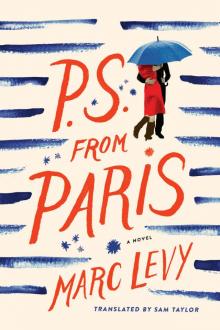 P.S. From Paris (US Edition)
P.S. From Paris (US Edition)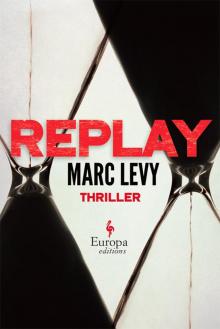 Replay
Replay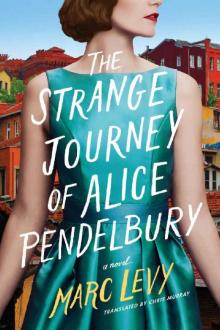 The Strange Journey of Alice Pendelbury
The Strange Journey of Alice Pendelbury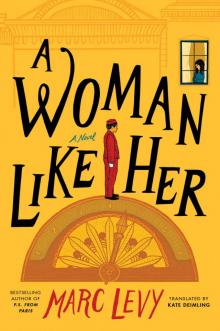 A Woman Like Her
A Woman Like Her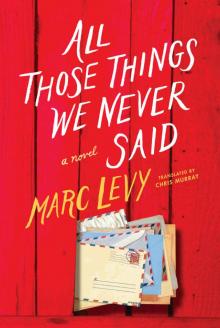 All Those Things We Never Said
All Those Things We Never Said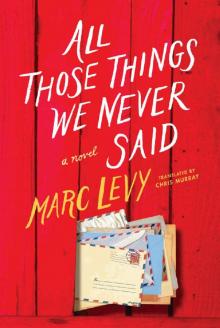 All Those Things We Never Said (US Edition)
All Those Things We Never Said (US Edition)